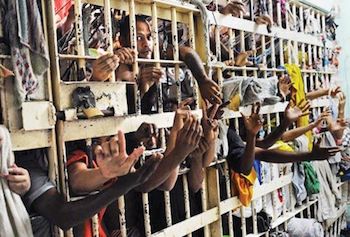Covid and the Prison System

As always, natural disasters are really human-disasters, exacerbating preexisting inequalities that people don’t want to talk about. With Covid, and for that matter with other communicable diseases such as tuberculosis, one of the really big examples of this has been the globally awful prison system, where the nation just throws mostly people of color down the toilet. This by no means is just a U.S. problem, though it is very much a U.S. problem too. “How the Other Half Dies” is an A+++ article title on this issue in Brazil, at the Boston Review.
Nine years ago Rafael Braga was collecting cans to recycle for cash not far from a political demonstration in Rio de Janeiro when he was stopped and arrested by police. A twenty-five-year-old Black man, unhoused at the time, Braga carried two bottles of cleaning detergent in his pocket. Police claimed he carried explosives.
The judge bought it. Braga was convicted of possession of a Molotov cocktail and sentenced to five years in Rio’s Bangu Penitentiary Complex, a maximum security prison. He was the only person to land a prison sentence during the countrywide Revolta do Vinagre, or Vinegar Protests, which rocked the country in 2013 after protesters were arrested for carrying vinegar as a remedy for tear gas used by police. In 2015 Braga was released with an ankle monitor but soon rearrested and charged with drug trafficking after police found him carrying less than a gram of marijuana. Two years later his lawyers announced that his already severe eleven-year sentence for the trafficking charge had been effectively increased: like more than 10,000 other incarcerated Brazilians that year, Braga had been diagnosed with tuberculosis (TB).
Braga’s story highlights the insidious and growing role prisons play in fueling another devastating pandemic most of the Global North has all but forgotten. Before SARS-CoV-2 spilled over into humans, TB claimed more lives worldwide than any other infectious disease. In 2019 alone, 1.4 million people died of the illness—more than twice the number who succumbed to HIV/AIDS—while some 10 million people fell ill, all of whom require a grueling six-month treatment regimen of antibiotics that often come with intense side effects. The COVID-19 pandemic has only made things worse. For the first time since 2005, the global TB death toll increased in 2020, a result of widespread disruptions in access to essential health care, leaving millions more people undiagnosed and without treatment. As these missed cases transmit infection in turn, the effects of COVID-19 on global TB cases and deaths are predicted to escalate in the coming years.
Despite this incredible toll, we in the United States hardly ever hear about the steady stream of people who fall victim to this forgotten pandemic. There is no New York Times world map for TB, no daily mass media surveillance of global case and death counts—no mechanism, that is, to fuel popular outrage or even awareness of so much needless and preventable death. As with many global health crises, from the extreme weather accompanying climate change to the rapid spread of drug-resistant bacteria, the impact of TB falls overwhelmingly on the poor and non-white. And as Braga’s case makes clear, reckoning with its burden today requires facing how the disease is perpetuated by institutionalized racism, global capitalism, and mass incarceration.
